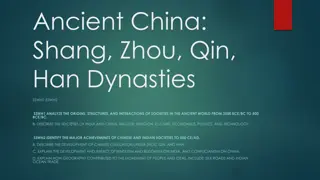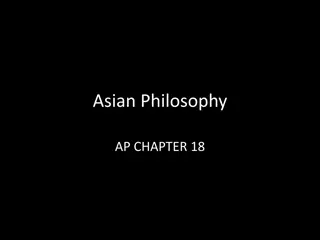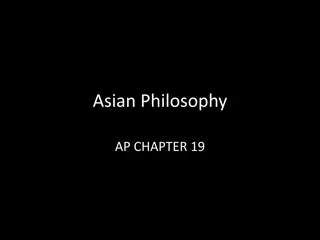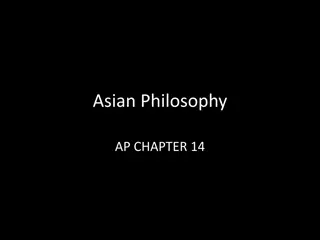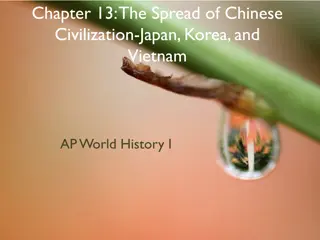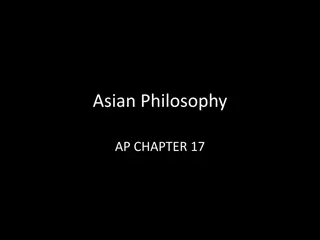Ancient China: Societies, Philosophies, and Dynasties
Ancient China's history is rich with the Shang, Zhou, Qin, and Han Dynasties shaping society. Various philosophies like Confucianism, Daoism, and Legalism influenced politics and culture. The Mandate of Heaven concept emphasized good governance. China's geographic location facilitated trade, notably
1 views • 16 slides
Daoism: Harmony, Nature, and Peace
Daoism, a philosophical view originating during the Warring States Period, emphasizes living in harmony with nature to achieve peace and well-being. Laozi, the supposed founder, advocated simplicity, minimizing desires, and embracing the natural way of life. The core text, Daodejing, guides follower
0 views • 18 slides
Insights into Zhuangzis Daoism: Commonalities and Differences
Explore the intriguing similarities and disparities between Zhuangzi and Laozi in their philosophical views on the Dao. Delve into the concept of the Dao as an undifferentiated whole, the perspectival nature of knowledge according to Zhuangzi, and freedom from the fear of suffering. Uncover how Zhua
0 views • 21 slides
East Asian Philosophy: From Confucianism to Daoism and Mohism
East Asian Philosophy, encompassing Chinese, Japanese, Vietnamese, and Korean traditions, is shaped by pillars like Confucianism, Daoism, and Buddhism. This philosophical landscape evolved from a rich tapestry of ideas, including Pre-Confucian China's historical context, the teachings of Confucius,
0 views • 21 slides
Chinese Dynasties and Philosophies: From Han to Tang
Explore the rich history of Chinese dynasties from the Han to Tang periods, including the influence of Confucianism, Buddhism, and Daoism on society and governance. Witness the rise and fall of empires, cultural blending, and the societal values that shaped ancient China.
1 views • 9 slides
The Influence of Chinese Civilization on Heian Japan
Heian Japan, ruled by the Yamato Imperial Family, experienced a cultural peak during the classical Heian period (794-1185). The Emperor, though symbolic, held sacred lineage while real power lay with the Fujiwara clan. Chinese influence shaped early Japanese culture through Buddhism, Confucianism, a
1 views • 19 slides
Development of Confucianism in Ancient China
During the Warring States Period in ancient China, Confucianism emerged as a response to the chaos and societal collapse. Confucianism, along with other philosophies like Daoism, Legalism, and Mohism, offered different solutions to restore order and harmony in society. Key figures like Mengzi and Ha
0 views • 27 slides
